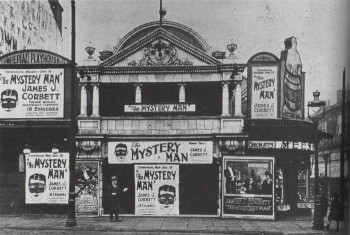John Cooper (JC-95-045) and Marion Cooper (MC-95-046)

Embassy Cinema, Bolton Uploaded by Ken Roe. Creative Commons (Attribution) License via cinematreasures.org
In Spring 1995, Cinema Culture in 1930s Britain contacted a number of local organisations in Bolton, Greater Manchester, seeking volunteers to take part in the project. Among these organisations was the Bolton branch of the Workers’ Educational Association (WEA) which supported a local history study group. Former study group secretary John Cooper and his wife Marion were among the twenty-two individuals living in the Greater Manchester area who were interviewed as core informants later in 1995.
Born respectively in 1915 and 1910, John and Marion Cooper were among our older participants (the median year of birth for all our core informants was 1919). Mrs Cooper was born in Little Lever, near Bolton, one of three children: her father, who was a Labour Party member and a local councillor, worked in a cotton bleachworks, as did her mother before she had children. Mrs Cooper left school when she was fourteen, and when she was twenty-seven went to agricultural college and later worked in a dairying laboratory. Mr Cooper, whose father was a cotton spinner, was born in Bolton. On leaving school at fourteen, he worked with his father as an operative cotton spinner and subsequently taught and lectured on textiles, latterly at the Bolton Institute of Higher Education. Mr and Mrs Cooper had both lived in and around Bolton all their lives, and were interviewed together at their home in Dunscar, Bolton, on 8 May and 14 June 1995. As they stress at the start of their first interview, neither informant had ever been a keen cinemagoer—though Mr Cooper was aware of the social contexts of interwar leisure activities and knowledgeable about Mass Observation’s 1930s Worktown studies. Mrs Cooper, who was “not encouraged” to go to the pictures as a child, recalls being taken to the cinema by her father on one memorable occasion, after which she was left wondering for years about how the ‘cliffhanger’ at the end of the serial was resolved. Mr Cooper notes that he considered most Hollywood films to be trivial rubbish, but that he would be interested in films based on literary sources. When her husband leaves the room towards the end of the interview, Mrs Cooper talks about her childhood in Little Lever, about going to dance halls in Bolton as a teenager, and family holidays in the nearby seaside resort of Fleetwood. For their second interview, the Coopers were joined by Mrs Cooper’s sister Alice, and the conversation begins with recollections of a famous experiment in progressive education in the village of Prestolee, not far from Little Lever where Mrs Cooper and Alice grew up. The Prestolee school was also a community centre that offered leisure activities at all hours—which meant that Prestolee didn’t need a cinema. The interviewees share memories of the only picture house in Little Lever and agree that cinemagoing was regarded as a working-class pursuit at the time. When talk turns to film stars, Mr Cooper remarks that he doesn’t know many stars’ names; and, talking about a cinema in Bolton, reiterates that “We didn’t go a lot”—though he did, he says, follow local celebrity Gracie Fields, and bought her records; he also mentions well-known Boltonians Alice Foley and Bill Naughton. Audio-synced interview (1 of 2)|
Interview transcript | Listing of cinemas, films and stars mentioned
Audio-synced interview (2 of 2)
Interview transcript | Listing of cinemas, films and stars mentioned
Interview transcript | Listing of cinemas, films and stars mentioned
Audio-synced interview (2 of 2)
Interview transcript | Listing of cinemas, films and stars mentioned
Documents, Memorabilia and Related Links
Bolton home pageKen Howarth 'An Oral History of Oral History' (British Library Sounds site)
Extract from 'Modern Times' with Charlie Chaplin, 1936 (YouTube)
National Clarion Cycling Club (clarioncc.org)